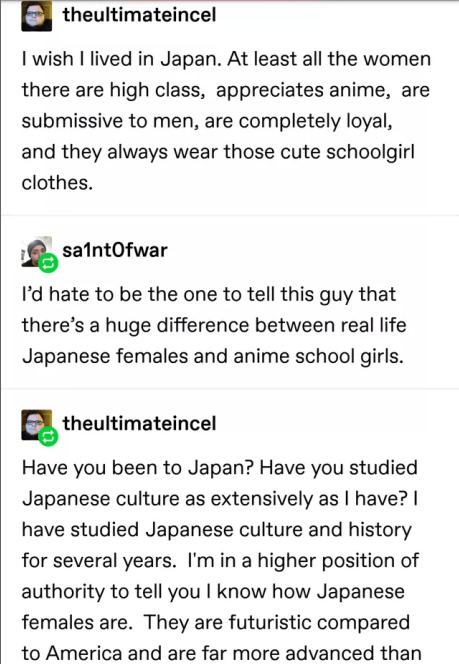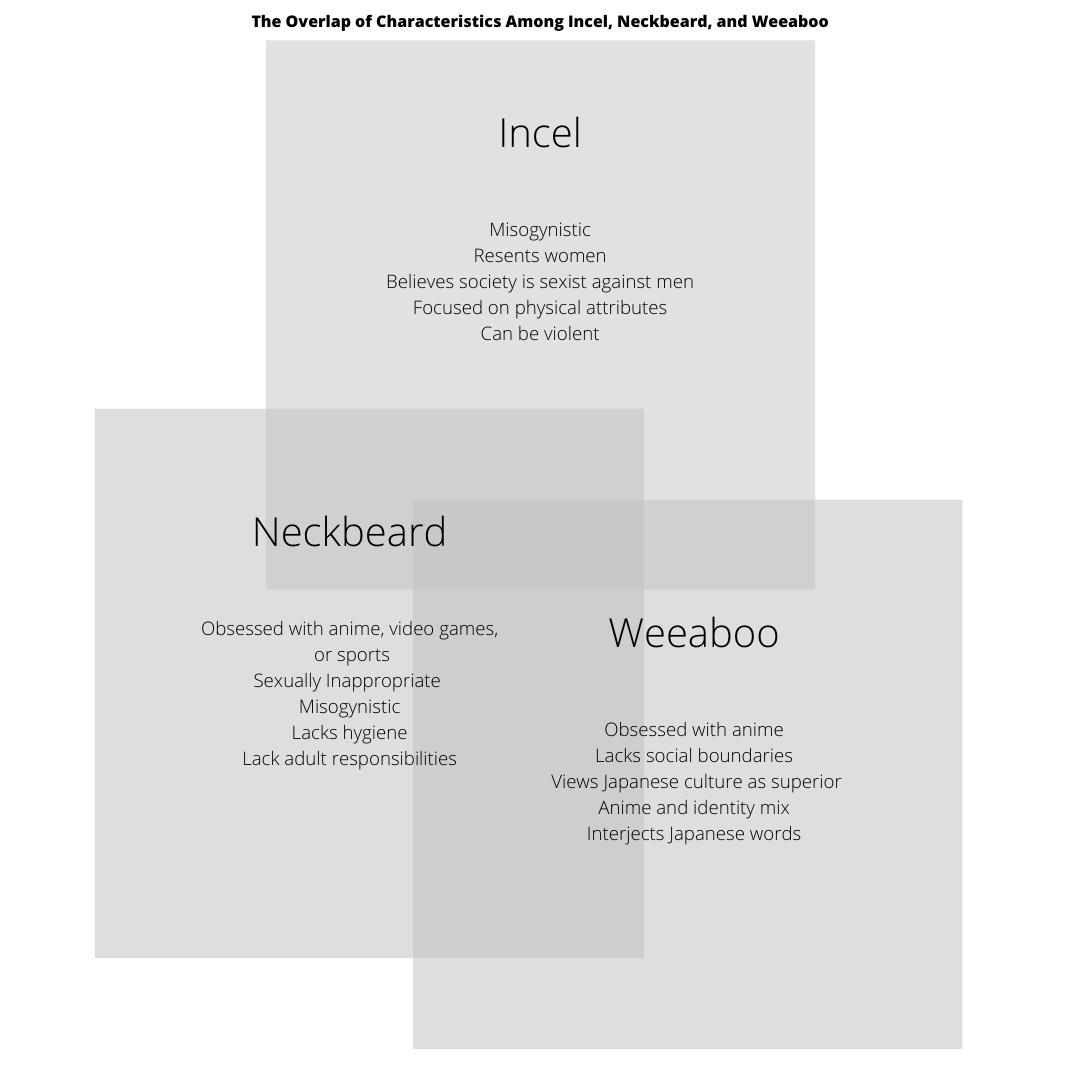 Anime and manga fans are often accused of being NEETs. In Internet parlance: neck-beards, otaku, slacker, hobo. But what is a NEET? NEET is an acronym for an English (as in British, the acronym started in the UK) expression: Not in Education, Employment, or Training. The acronym started in July 1999 in the report “Bridging the Gap,” a report that focused on social exclusion (Batini, 2017). The typical media image of a NEET is an overweight young man living in a basement covered in Cheetos dust with a shrine to his favorite anime waifu and a long-running World of Warcraft subscription.
Anime and manga fans are often accused of being NEETs. In Internet parlance: neck-beards, otaku, slacker, hobo. But what is a NEET? NEET is an acronym for an English (as in British, the acronym started in the UK) expression: Not in Education, Employment, or Training. The acronym started in July 1999 in the report “Bridging the Gap,” a report that focused on social exclusion (Batini, 2017). The typical media image of a NEET is an overweight young man living in a basement covered in Cheetos dust with a shrine to his favorite anime waifu and a long-running World of Warcraft subscription.
In the US, 57% of NEETs are women. In Italy, 1 out of 5 women are NEETs (Batini, 2017; Desilver, 2016).
So that means our media image of a NEET should be a female neck-beard with a shrine to her husbando who spends the day playing World of Warcraft.

Nope. In many countries stay-at-home mothers–and fathers–are considered NEETs. The problem with the idea of a NEET is how the definition varies across countries. All the definitions agree on the chief characteristic: inactivity. Some countries look at people aged 15-29, but Japan measures from 15-34. The periods of inactivity also varies. Asian countries track 4 groups of NEETs, for example (Batini, 2017):
- People who lack skills and education, but do not want a tough job and low wages.
- People who are hyper-protected by their parents.
- People who refuse to be employed by others because they want to build their own businesses.
- People who struggle with fitting into workplace demands–social etc.
You may be wondering where hikikomori fit in all of this. Well, hikikomori are considered a subcategory of NEET–they are people who isolate themselves from everyone for at least 6 months. Look at this article if you want to learn more about hikikomori.
Despite all this variable data, it is a global concern. The majority of NEETs don’t look for work because they have relatives that need care, health problems,. substance abuse problems, and the belief that any job search would be unsuccessful. I’ve ran into the last reason with many people. They feel as if they don’t have a chance after months and years of trying, and, sadly, some of them are right. They lack computer skills and other skills necessary to work. This ties into the common traits of NEETs: poor education and literacy.
Most NEETs lack higher level education and skill training, and NEETs are 80% more likely to come from families without college or vocational education. They are 2x more likely to have parents that don’t work, and these parents may fail to pass on the social skills necessary to work (Education Journal, 2016). NEETs suffer from a generational feedback loop. The issue compounds itself. NEETs lack the environment necessary to help them get into the labor market early which would allow them to get the experience necessary to find better work which could break the poverty aspect. The research papers I’ve read on this topic tout education as the key to breaking the loop and advocate increasing low-cost and free economic opportunities, but the papers also suggest despair, the feeling of being trapped, is a factor behind many NEETs. Providing education doesn’t necessarily address this feeling.
The Cost of Being a NEET

At first, it sounds neat (see what I did there?) to stay home and indulge in various fandoms (I would get soooo much writing and drawing done), but being a NEET comes at high personal and societal costs. Societal costs are the most obvious: NEETs don’t contribute to the economy and take from it through social programs like welfare, child-care vouchers, housing allowances, and other social assistance (Balan, 2016). Balan points out how this is a major cost for the European Union which has around 14 million NEETs. In 2015, the US had 10.2 million NEETs. I have to point out how in the US Blacks and Hispanics are most likely to be NEET: 22% of young blacks vs. 16% of whites, 20% of Hispanics are NEETs too (Desilver, 2016). Again, this is the connection to poverty working.
Families support many NEETs, particularly in Asia as anime likes to point out. This drains the family’s economic welfare and adds strain to family (Balan, 2016). Aside from economic costs, NEETs report higher rates of stress, panic, anxiety, frustration, and anger. Some NEETs fall into anarchic behavior and even terrorism (Balan, 2016). But on the whole, NEETs as a group show less interest in politics than people who work or are in training. Some of this may come from the feeling situational helplessness many NEETs feel or their struggle to meet their obligations; studies suggest pregnancy and children are the main reason behind female NEETs (Maguire, 2015).

I’ve seen some people say NEETs have only themselves to blame. They are lazy and irresponsible. But this view is too simple. It may be valid for some situations, but family culture and government policies matter too. Some people are NEETs because of social exclusion: rigid categories like race and gender roles. Some checkout from society because of discrimination. Others lack opportunity to work or enter training in their area, and they lack the means to move to an area with those opportunities (Mihai, 2015). Labeling NEETs as lazy or irresponsible allows the accuser to feel morally superior. It doesn’t help.
Of course, there is a subset of NEETs that willingly check out from society. They would rather live in their fantasy worlds than face the messy, ugly world around them. Somehow, this tiny silver became the flag-carrier for all NEETs. This caricature keeps people from taking the problem of NEETs seriously. Most NEETs would like to have more income and reduced anxiety, but the factors we’ve discussed work against them. It also hurts otaku culture. Few otakus are NEETs. I mean, just look at how expensive it is to be an otaku. Merchandise, manga, and anime aren’t cheap. In fact, its rather silly that NEETs and otaku are equated when we consider this. Of course, anime uses the NEET’s standard caricature, which has encouraged the association. In reality, otakus need significant income to indulge their fandom.
It’s easy for us to forget that NEETs are people with dreams and concerns like everyone else. Vilifying them doesn’t help the problem, nor does equating them with media caricatures.
References
Balan, M. (2016) Economic and Social Consequences Triggered by the NEET Youth. Knowledge Horizons – Economics. 8 (2) 80-87.
Batini, F. & others (2017) NEET: A Phenomenon Yet to be Explored. Interchange. 48. 19-37.
Desilver, D. (2016). Millions of young people in the U.S. and EU are neither working nor learning. Pew Fact-tank. http://www.pewresearch.org/fact-tank/2016/01/28/us-eu-neet-population/
Maguire, S. (2015) NEET, unemployed, inactive or unknown – why does it matter?, Educational Research 57 (2) 121-132.
Mihai, M. & Burciu, A. (2015) NEET and Youth Exclusion. The Romanian Economic Journal. 18 (56). 135-147.
What to do about NEETs. (2016). Education Journal, (282), 13-17.






I found this by accident searchinf for the definition of a NEET, a friend of mine calls themself that and says that they dont ever want to work with anything, hes going to college and studying a subject he enjoys but once its not the way he wants it to be he hates it. The way he sees things makes it seem like he has a heirloom to keep him living comfortably and maintaining his way of life when… He is far from being rich or being a heir. He’s pretty much the otaku neet steryotype, and honestly he seems to take pride in that and seems to purposefully dwell into that steryotype. I mean, its up to him to live the way he wants to but I cant helo but feel concerned, yer at the same time a bit angry.
Concerned cus he doesnt want to even try and find a job that isnt slightly not too hard or too shitty, cus even if you fins a job, work is work, and its not supposed to be fun like a hobby would and that is hard for a lot of people.
Angry because he speaks as if his life will always be like this and nothing bad will ever happen to him and he can keep living in his fantasy world. This comes from a certain place of jealousy, because I kyseld coukd fit under some people’s definition of a NEET, im unemployed, have no college degree, I am disabled and have a tom shit of mental ilnesses that cripple me and make life really hard to live and basic tasks like caring for myself and house become hell. Im actively searching for a job and doing art comissions because on top of all that I also live in a extremely abusive house hold that adds into the reasons as to why I get bed ridden because of depression, or cant find a job easily. I cant get on disability aids because of how my country’s law works and has changes recently. So I just live in despair. So hearing my friend see life the way he does, thibkinf its all butterflies and rainbows and thinkonf his momma will be forever there to care for him and give him money, makes me very angry. I feel like the definition of neet should not be all enconpasing and at least have sub categories specifying specific cases. I dont know how a stay at home mother or father would be a neet, their work is the house labour. How who defines neet don take into consideration disability, mental health, social class and so on. They make it seem like everyone start on the same place in life, would you call a billionaire or a heir of a billionaire tgat doesnt do shit with their lives cus they dont have to a NEET? No right? then why does it seem that the definition ignores social class completely? Tgere are so many societal factors behind a “neet” and most of them are out of control of those people, in that case, people tgat do actually want to or contribute to society in someway, not those whi willingly dont want to partake in it like that friend of mine.
For me a stay at home oarent or adukt children who take care of family members being considered neets, or at least being frowned upon is so wild to me?? Or people like me who physically cant do certain kinds of work and are rejected for that or other factors like being queer, colored, etc.
Many definitions of NEET do ignore socioeconomic status, which is why I tried to keep to the academic definition which acknowledges disability, socioeconomic status, mental health, and so on. The majority of NEETs are stay-at-home mothers because of how most government define NEETs–those who don’t add to the GDP in measurable ways.
Many NEETs come from families which are also NEET and are impoverished. Many countries which have social safety nets are starting to reduce their budget and reach, like in the US, which will force many NEETs (by choice or by circumstances/health) to work or starve. It’s a difficult position to be in when circumstances and health prevent you from working when you want to work. One of the traits of stereotypical NEET is the reluctance to work and provide for themselves coupled with some meager form of income which enables them, such as your friend and their mother, or social safety nets. Eventually, providers won’t be able to provide for the NEET, and the NEET, like you friend, won’t have skills or the social abilities necessary to provide for themselves.
I hope you are able to work through your problems. From what you shared, you differ from most NEET mentalities in that you want to provide for yourself in some way. If you keep job hunting, you will eventually find something. It’s mostly a large numbers game. In the US, most job hunters spend over 20 weeks between jobs according to 2023 US Bureau of Labor Statistics. This time will vary by country and time period, of course. But it illustrates job hunting takes a lot of time, with many experts recommending sending out 2-3 customized job applications a day at least, which would be around 300 applications across the average US between-job period, assuming you hunt 5 days a week.
“Of course, there is a subset of NEETs that willingly check out from society. They would rather live in their fantasy worlds than face the messy, ugly world around them” A lot of those people are 3rd world migrants(who come ether illegally, overstay visas or by making fraudulent asylum claims) who should be deported for stealing from the hard working native Europeans, so they should 100% be vilified and given 0 sympathy
Do you know of any research data that shows this? I am curious to see if such NEETs differ. I disagree with you, however. The fact they are human is all the reason we need to show them sympathy and not vilify them, especially anyone who claims to be a Christian (which many the US claim) or a humanist. Vilifying goes against both belief systems. There’s a lot of middle ground between being too softhearted and too harsh. Deportation isn’t ruled out nor is a citizenship path in this middle way.
85% of “refugees” in the Netherlands lived off welfare until Wilders cracked down on welfare tourism and nearly 80% of refugees in Sweden holiday in the places they allegedly fled from. There are genuine refugees who deserve compassion and support and contribute to society. However, if you cross by half a dozen safe countries, claim asylum in a welfare haven or submit a fraudulent asylum claim and sign up for welfare you are defrauding the asylum system. This is a form of vote buying, a practice associated with corrupt regimes like Zimbabwe or Venezuela just so unpopular liberal regimes can stay in power while citizens foot the bill. Milton Friedman rightfully said you cant have a welfare state and open borders
I wonder how many of those percentages you’ve offered still worked. People have an innate drive to work and contribute in some way; the drive is more common than the drive to mooch.People here in the states have a similar perception of those who draw on welfare programs–most who draw from the programs still work. No system can eliminate freeloaders. NEETs aren’t as common as media likes to portray, and many tend to be mothers because of the way nations measure “productivity.”
I certainly agree with you that open borders are a problem and not sustainable. However, history has shown that walls and deportations don’t work in the long-term. China learned that with the Great Wall. They were eventually conquered by the very peoples they tried to wall out. Only Japan managed to succeed for a time during the Edo period; although I wonder if much of that is overblown. There’s some evidence of regular small, illegal migrations from Korea and China over that period. Nations which want to staunch illegal immigration need to address the problems behind that migration in the source countries. People won’t immigrate if they don’t have a need to do so. This is what I mean by the middle way in my previous comment.
What should we do with all the welfare tourists already here then?
A middle approach might be to deport those who are convicted of crimes other than illegal entry. Illegal entry after a certain period would be enforced as current law would dictate. So if you immigrated illegally within a certain window of enforcement (let’s say a country didn’t enforce its border laws for a period of 5 years), you would qualify for a “path of citizenship” program or choose to leave with a small startup payment. Generosity is a show of a country’s strength and acts as an extension of soft power. Lack of generosity is a show of weakness and hurts soft power extension. As a part of the path to citizenship, these immigrants would be taxed a bit more over a period of 10 years to pay back whatever benefits they used during their illegal-status period. Job placement and education assistance would be exempted from this because these measures usually result in more tax income for the state. While some citizens would consider such a program unfair–that illegals are getting something I don’t–measures like this strengthen society by increasing its tax base, decreasing poverty (which decreases crime risks), fostering a sense of gratitude, and many other factors. Citizens often already have access to similar programs, but they aren’t aware of them. News media fail to report on these programs.
First, thanks to the author for a thoughtful and researched approach to the topic. Here’s my perspective:
“NEET” is a societal definition. Academic, employment, and social circles provide the social contacts necessary to find (better) jobs (or a spouse). Many jobs are filled via “off-channel” personal referrals. That doesn’t mean you can lack all technical skills, but some employers are more flexible if they already think you’re the ‘right fit.’
Volunteer work, low skill work, and goal-focused online groups might help bridge the social and/or experience gap that hold some back. We are generally more adaptable than we realize, and we can develop new and better skills and habits with consistent effort over time.
And, some of us should learn marketing, because if no one knows about it, it doesn’t exist to them.
I want to stress the importance of maintaining a positive and pro-active mindset. Never give up and never stop moving forward, no matter what. People can and will judge you, but you define yourself!
The experience feedback loop–when you need experience to get experience–can be difficult to overcome. As you say, it often reduces to who you know, so you have to get out into the public and make those connections. Volunteer work is a good suggestion!
Great article! I had someone ask me if I was a NEET today and had to Google it to be sure. This came up and I was happy to see it was so well rounded. I do not consider myself a NEET but I do think its interesting that a lot of people have complained about my lifestyle before and think that I am an “unproductive” person.
I am an American living with my mother at 28 years old and have never felt compelled to move out and have my own career, because I am focused almost entirely on family. I help my retired mother manage a big home because my father is out of the country and has been for almost 20 years, and all of my siblings have moved out. This turned out to be a good move because now my mother has stage 4 cancer and she needs more help and company than ever.
At the same time as I’m here for my mother, I also get to pursue a very loose freelance art career that doesn’t stand out when other people see me, so I am considered “unemployed”. I don’t take many commissions because I don’t need a lot of money, I don’t spend much money either and have a much simpler life than my friends who have a million subscriptions and video game shopping habits that I’ll never understand. I also don’t have a car and don’t ever eat out. So being unemployed and working for my parents in this house by simply BEING here, is enough for my living standards.
I got a GED and dropped out of high-school, and only pursue education for myself for free online. I still have people telling me I should look into a college degree in art to “help my career” but I don’t wish to spend money to be taught basically nothing I dont already know, in order to “have a career” that I already have. I get paid just fine with no degree. I only take jobs I want to take. But still, people expect me to go through the system like they did in order to follow their version of what my dreams should look like? It’s very strange.
I see myself as one of those women that lived before first wave feminism set in. I’m entirely comfortable learning to keep house, cook, clean, raise children, and have creative hobbies on the side, while I wait to meet a man who will give me a reason to start a family in a new home. There’s just no reason at all for me to divert this path to work at some customer service job, or go to school so I can pay for things that I don’t need, until I find a husband, quit my job and go back to essentially the same lifestyle I’m living now.
I wonder how many people are like me, and just don’t fall for the “productive in society” trap. (Its not a trap for everyone, but there are plenty of people who just dont need it) If I’m of service to my community, I am happy and whole. I don’t “take” from anyone, so I am not a drain either. But, frustratingly enough, people on the outside looking in, will continue to see me that way, even my own siblings. But for them I usually say “my motivations are not your motivations, so my work is not your work”. And that’s all I can do.
I hope all my NEET brothers and sisters will find a way to be productive in their own lives, in paths that they love to be on since everyone should be striving for something. But it does not have to look like everyone else’s lives. There is no law that says you have to live like they tell you, only take responsibility for yourself, and be kind ♥️
American society is certificate focused. It seems everything has some sort of qualifying certificate you have to earn. Our culture has many blindspots in regards to productivity. The work you do, along with other stay-at-home caregivers, are mistakenly considered unproductive. This is far from reality! For most of human history, this work was considered critical to society. This is far different from being a NEET, who doesn’t even bother to clean their own rooms in many cases.
You are right: the key is finding your purpose and putting that purpose into practice.
Thanks for sharing your uplifting perspective!
You don’t have to be unskilled to be a NEET. I’m a software developer, and I applied for 2500 jobs in ten years to eventually get work as an *IT* *technician*.
You make a good point. Studies can only focus on general trends. There’s always exceptions.
I’m not sure how the search engine found this blog from a search query about anime guidelines for drawing, but a few clicks and reads got me to this article and I enjoy this blog so much already.
I don’t know whether I can be categorized as a NEET but I stay home because of a mental illness (that hasn’t shown any symptoms for about 8 years) and I devote most of my time toward independent game development, to the point I severely blame myself whenever I spend time playing a game for long enough. Anime, cartoons, and even live action or even movies or long youtube videos became difficult to enjoy for me as I seem to lack enough attention span to consume anything I can’t interact with. I probably fall into the category of “People who refuse to be employed by others because they want to build their own businesses.”
Make no mistake, I’m a hard working person at heart, but I sort of became obsessed with being creative and I cannot imagine having to have a common job that robs me out of my dreams, artistic growth, and the ever so precious life of which I have less hours due to the medication I’m taking that makes me sleep longer.
That being said, I’m a self taught and experienced programmer but I also don’t have enough confidence to be employed due to the feeling and doubt that my code still isn’t professional level.
Thank you for the great reads. I will come back to this blog.
You have your own business, so that means you can’t be a NEET. Typically, NEETs make no effort to contribute to society. Producing art, games, and other–sadly–low-paying cultural contributions matters! Congrats on working toward your own indie games! Have you read about Stardew Valley’s development?
Imposter Syndrome takes hard work to break out of; sometimes, the best course (at least what I did) is ignore all your fears and imposter-thoughts and do it anyway. In fact, every time I publish a new book, I have to face these fears and thoughts.
Thank you! I’m pleased you find JP helpful and interesting.
My psychology is built in a way in which I can’t stand doing nothing that contributes to society in some way either, even if that means there is a delay due to the nature of some independent production. I see now that I can’t be a NEET since I’m far from overconsuming entertainment and rather, try to avoid it by creating something that entertains instead – this makes me feel sorry when I find myself playing a game for long enough. One of the banes I should get sorted and take it with a rational and pragmatic approach.
I know some information about the Development of Stardew Valley from some time ago, and I consider it a great inspiration, and unsurprisingly, it being inspired by a Japanese game series. I feel like Japan has a very important influence on the world in many cultural aspects, despite being a somewhat small island country. I myself have chatted with a Japanese player of a Japanese online game who stated herself that Japan is a small country, which made me think just how much the power of culture and discipline can bring. Not everyone is built to withstand the same things, but we are all unique still, and like said in your article, even NEETs are people with dreams and concerns. I feel the world would be a much better place if most people realized that.
Yes, it’s difficult. I just feel like I’ll never be good enough to actually do programming professionally, even though my many personal breakthroughs say otherwise. I aspire to finish writing my novel one day that I repeatedly tried to turn into a comic by myself (but severely lacked the tenacity and willingness of time investment – serial drawing is crazy), and I may actually buy some of your works once I get past my paranoia of using my card online (sweat drops)
No problem, it’s a splendid work to keep writing a blog for so many years. Anyone has the power to make someone’s days better, and I enjoy some informative reads presented in a comfy fashion.
-Charles.
Many people don’t understand the importance of soft power for a nation. Japan is a good example of how effective soft power can be with its cultural exports. Soft power is invisible and requires patience, however.
I’ve seen some pretty terrible professional code…I mean, just look at how slowly Windows runs nowadays ;). Documentation is critical to good code!
Good luck with your projects. You can do it! Or, maybe I should write: You will do it!
Huh.. My name is Inna, I’m a NEET and hikki in age from Eastern Europe(UA)
and I really realy liked this think piece (article). Every word here is true.
Thank you, Inna. Do people make your life difficult for being a NEET? If so, why do you think they do?
Err.. English is not my native language, sorry, sir, but I will try to answer a bit.
There are two categories in your article that touch to me:
“People who lack skills and education, but do not want a tough job and low wages.
People who struggle with fitting into workplace demands–social etc.” (c)
When I tried to find a job, any unskilled labor, I received 5 or 6 failures (unreasonable rejection). When an employer sees that I have not had ANY job for the last TEN years – he is really afraid to deal with me. It’s a vicious circle.
I have my own problems, body dysmorphic disorder etc. People look at me like I’m a freak.
And so on and so forth..
Your English is very good. Thank you for sharing your experiences. It will help other people who struggle with the same problems. Society can be too unforgiving, and people often lack compassion.